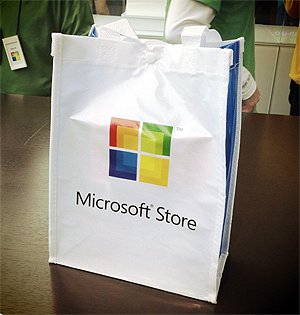The Microsoft Store in Santa Clara, California where Sahas Katta took the Windows Phone challenge.
Microsoft opened the first two branches of The Microsoft Store back in October 2009. But its retail chain didn’t reach the San Francisco Bay Area until November of last year, when a branch opened up across from the Apple Store at the Valley Fair Mall in Santa Clara. And I didn’t get around to visiting that location until Saturday afternoon.
From the moment that Microsoft’s plans to open stores became public, I was doubtful about the idea. Apple’s products are a coherent organizing principle for a retail establishment. Microsoft’s–which include everything from games to boring business software–didn’t seem to be. It felt like the software behemoth of Redmond was getting into the business out of a slavish need to mimic Apple’s success rather than as a rational business decision.
When I dropped by the Valley Fair Microsoft Store, I was still struck, first of all, by slavish mimicry. The exterior, with a wordless logo rather than the name “THE MICROSOFT STORE” is such a rote imitation of the Apple Store that I felt a vague sense of pity as I entered. The hardwood floors, the tables of computers up front and shelves of software and accessories in the back–in multiple ways, the store had the same relationship to an Apple Store that the Zune had to an iPod.
Historians may remember that Microsoft opened a short-lived single shop in San Francisco in 1999, before Apple got into retail business. But it seems a given that the current incarnation of the Microsoft Store wouldn’t exist without Apple’s influence. It’s a knockoff.
Still, visiting the store left me at least slightly less skeptical about the concept. On this particular weekend afternoon, at least, the place was busy–not quite as bustling as the Apple Store across the hall, but close. There were consumers of all ages everywhere. They seemed to be having a good time. Thanks in part to the much heavier emphasis on games–there were kids playing Kinect up front–the mood was more boisterous than the Apple Store’s tasteful elegance.
There were scads of PCs for sale–far more models than at the Apple Store. The emphasis was on interesting form factors: Ultrabooks, “Slate PCs,” and all-in-ones, for instance. As in an Apple Store, visitors were welcome to try them out–in fact, there were stools at each machine, in case anyone wanted to sit down and stay awhile. It was a far cry from the PC department at a big-box store such as Best Buy, where Lowest Common Denominator systems are everywhere, are usually not set up for test drives, and often are missing keys or otherwise in a state of disrepair.

Harry McCracken / TIME.com
In fact, as I hung around the Microsoft Store, I started comparing it as much to Best Buy as to the Apple Store. Besides the brand-name PCs, Microsoft has stocked its shelves with products other than its own–Jawbone’s Jambox portable speaker, for instance–and the organizing principle of the store was less “Microsoft products” than “Cool PCs and the Xbox 360, and cool products to use with them.”
And I even found something I wanted to buy. Earlier that day, I’d visited a humongous Fry’s location in search of a Webcam with a tripod mount. It stocked a couple of dozen models, none of which fit the bill. The far smaller Microsoft Store only had a handful of Microsoft’s own Webcams–but one of them was the tripod-friendly LifeCam Studio.
It was an inviting environment for browsing and buying, and reminded me that the history of PC retailing is dominated by unpleasant chains that eventually went bust, such as CompUSA and Circuit City. (Even megasuccesful Best Buy is having its problems these days.)
Almost nobody has ever tried to make a PC retailer nice. The Microsoft Store is nice.
I don’t know how much money Microsoft is making in its stores, or whether it’ll live up to its plans to open dozens more storefronts over the next few years. It’s possible that it’s a vanity project more than anything. But even if the Microsoft Store began as an Apple Store clone, it seems to be a pleasant place filled with worthwhile products. For that reason, I’ll be happy if it succeeds, and sorry if it goes belly-up.


